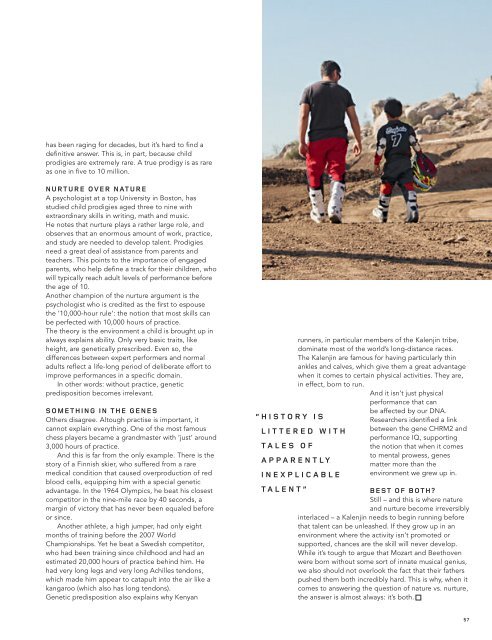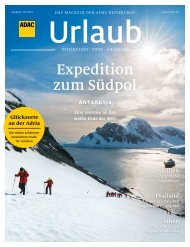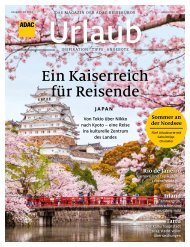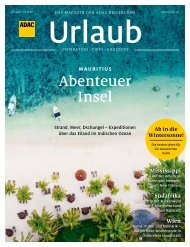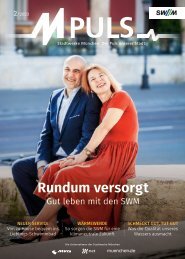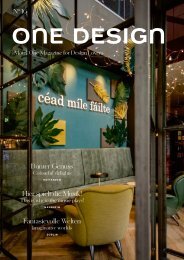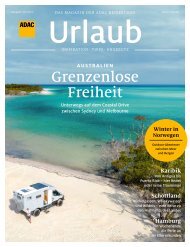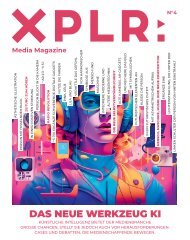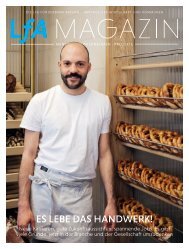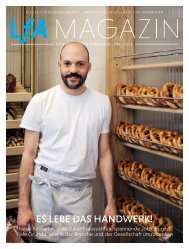ONELIFE #33 – American English
Land Rover steht für höchste Allradkompetenz, umfassenden Komfort und anspruchsvolle Technik. Diesem Geländewagen ist kein Weg zu weit und keine Aufgabe zu schwer – getreu dem Slogan „Above and Beyond“. ONELIFE vermittelt Land Rover-Kunden genau dieses Gefühl von Abenteuer und Freiheit.
Land Rover steht für höchste Allradkompetenz, umfassenden Komfort und anspruchsvolle Technik. Diesem Geländewagen ist kein Weg zu weit und keine Aufgabe zu schwer – getreu dem Slogan „Above and Beyond“. ONELIFE vermittelt Land Rover-Kunden genau dieses Gefühl von Abenteuer und Freiheit.
You also want an ePaper? Increase the reach of your titles
YUMPU automatically turns print PDFs into web optimized ePapers that Google loves.
BORN WITH IT<br />
has been raging for decades, but it’s hard to find a<br />
definitive answer. This is, in part, because child<br />
prodigies are extremely rare. A true prodigy is as rare<br />
as one in five to 10 million.<br />
NURTURE OVER NATURE<br />
A psychologist at a top University in Boston, has<br />
studied child prodigies aged three to nine with<br />
extraordinary skills in writing, math and music.<br />
He notes that nurture plays a rather large role, and<br />
observes that an enormous amount of work, practice,<br />
and study are needed to develop talent. Prodigies<br />
need a great deal of assistance from parents and<br />
teachers. This points to the importance of engaged<br />
parents, who help define a track for their children, who<br />
will typically reach adult levels of performance before<br />
the age of 10.<br />
Another champion of the nurture argument is the<br />
psychologist who is credited as the first to espouse<br />
the ‘10,000-hour rule’: the notion that most skills can<br />
be perfected with 10,000 hours of practice.<br />
The theory is the environment a child is brought up in<br />
always explains ability. Only very basic traits, like<br />
height, are genetically prescribed. Even so, the<br />
differences between expert performers and normal<br />
adults reflect a life-long period of deliberate effort to<br />
improve performances in a specific domain.<br />
In other words: without practice, genetic<br />
predisposition becomes irrelevant.<br />
SOMETHING IN THE GENES<br />
Others disagree. Altough practise is important, it<br />
cannot explain everything. One of the most famous<br />
chess players became a grandmaster with ‘just’ around<br />
3,000 hours of practice.<br />
And this is far from the only example. There is the<br />
story of a Finnish skier, who suffered from a rare<br />
medical condition that caused overproduction of red<br />
blood cells, equipping him with a special genetic<br />
advantage. In the 1964 Olympics, he beat his closest<br />
competitor in the nine-mile race by 40 seconds, a<br />
margin of victory that has never been equaled before<br />
or since.<br />
Another athlete, a high jumper, had only eight<br />
months of training before the 2007 World<br />
Championships. Yet he beat a Swedish competitor,<br />
who had been training since childhood and had an<br />
estimated 20,000 hours of practice behind him. He<br />
had very long legs and very long Achilles tendons,<br />
which made him appear to catapult into the air like a<br />
kangaroo (which also has long tendons).<br />
Genetic predisposition also explains why Kenyan<br />
runners, in particular members of the Kalenjin tribe,<br />
dominate most of the world’s long-distance races.<br />
The Kalenjin are famous for having particularly thin<br />
ankles and calves, which give them a great advantage<br />
when it comes to certain physical activities. They are,<br />
in effect, born to run.<br />
And it isn’t just physical<br />
performance that can<br />
be affected by our DNA.<br />
“ H I S T O R Y I S<br />
Researchers identified a link<br />
L I T T E R E D W I T H between the gene CHRM2 and<br />
performance IQ, supporting<br />
T A L E S O F<br />
the notion that when it comes<br />
to mental prowess, genes<br />
APPARENTLY<br />
matter more than the<br />
I N E X P L I C A B L E environment we grew up in.<br />
TALENT”<br />
BEST OF BOTH?<br />
Still <strong>–</strong> and this is where nature<br />
and nurture become irreversibly<br />
interlaced <strong>–</strong> a Kalenjin needs to begin running before<br />
that talent can be unleashed. If they grow up in an<br />
environment where the activity isn’t promoted or<br />
supported, chances are the skill will never develop.<br />
While it’s tough to argue that Mozart and Beethoven<br />
were born without some sort of innate musical genius,<br />
we also should not overlook the fact that their fathers<br />
pushed them both incredibly hard. This is why, when it<br />
comes to answering the question of nature vs. nurture,<br />
the answer is almost always: it’s both.<br />
57


